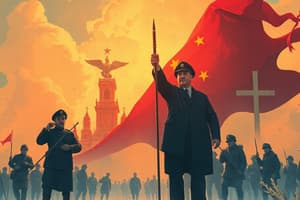Podcast
Questions and Answers
What was the name of the organization established by the Soviet Union to counterbalance American influence in Europe?
What was the name of the organization established by the Soviet Union to counterbalance American influence in Europe?
Eastern European Council
What was the purpose of the Marshall Plan introduced by the United States in 1948?
What was the purpose of the Marshall Plan introduced by the United States in 1948?
To provide financial assistance to help rebuild war-torn European economies
How did the Soviet Union perceive the Marshall Plan introduced by the United States?
How did the Soviet Union perceive the Marshall Plan introduced by the United States?
As an act of aggression against their sphere of influence
What was the policy adopted by the United States to prevent further expansion of Soviet control over other countries?
What was the policy adopted by the United States to prevent further expansion of Soviet control over other countries?
What were some of the factors that set the stage for the long-lasting conflict known as the Cold War?
What were some of the factors that set the stage for the long-lasting conflict known as the Cold War?
What role did ideology play in fueling the rift between the United States and the Soviet Union during the Cold War?
What role did ideology play in fueling the rift between the United States and the Soviet Union during the Cold War?
How did power politics and territorial disputes contribute to the origins of the Cold War?
How did power politics and territorial disputes contribute to the origins of the Cold War?
What historical roots can be traced as contributing factors to the start of the Cold War?
What historical roots can be traced as contributing factors to the start of the Cold War?
How did the U.S. perceive communism after World War II in relation to the Cold War?
How did the U.S. perceive communism after World War II in relation to the Cold War?
What significant policy did the U.S. introduce in 1947 to counter the spread of communism abroad?
What significant policy did the U.S. introduce in 1947 to counter the spread of communism abroad?
Flashcards are hidden until you start studying
Study Notes
Cold War: A Persistent Conflict of the Modern Age
The term "Cold War" emerged during the post-World War II period, implying ongoing tension between two major competitors without open conflict. Although it did not commence with a bang, this persistent conflict had deep historical roots. Its origins can be traced back to various factors, including ideological differences, power politics, territorial disputes, and geopolitical interests. Here's how these aspects contributed to the start of the Cold War.
-
Ideology: Fueling the Divide
Ideology played a significant role in fueling the rift between the United States and the Soviet Union. After World War II, the U.S. became increasingly concerned about the spread of communism globally, while the Soviet Union saw capitalism and democracy as potential threats to its socialist system. This ideological divide intensified when Joseph Stalin became the leader of the Soviet Union after Lenin's death.
-
Power Politics and Territorial Disputes
The origins of the Cold War can also be traced back to power politics and territorial disputes. The division of Europe into Eastern (communist) and Western (capitalist) spheres led to intense competition between the two superpowers. For example, in 1947, the U.S. came up with the Truman Doctrine, which declared that it would prevent the spread of communism abroad by providing economic aid to countries under threat from it. In response, the Soviet Union established the Eastern European Council, aiming to counterbalance American influence in Europe.
-
Geopolitical Interests
Geopolitical interests further exacerbated tensions between the two powers. For instance, the Marshall Plan, introduced by the United States in 1948, aimed to provide financial assistance to help rebuild war-torn European economies, many of which were in need after World War II. This was seen by many Americans as an attempt to contain Soviet expansion and to promote capitalist economic development. The Soviet Union perceived this as an act of aggression against their sphere of influence.
Moreover, the situation escalated when the United States adopted a policy of containment, which involved preventing any further expansion of Soviet control over other countries. This led to increased political, military, and economic pressure on areas controlled by the Soviet Union or where there was a risk of pro-Soviet governments coming to power. These geopolitical interests set the stage for the long-lasting conflict.
In conclusion, the Cold War had deep historical roots, stemming from ideological differences, power politics, territorial disputes, and geopolitical interests. It started not with an explosion but rather as a gradual build-up of tension between the United States and the Soviet Union, eventually leading to a sustained global struggle that lasted for decades.
Studying That Suits You
Use AI to generate personalized quizzes and flashcards to suit your learning preferences.




